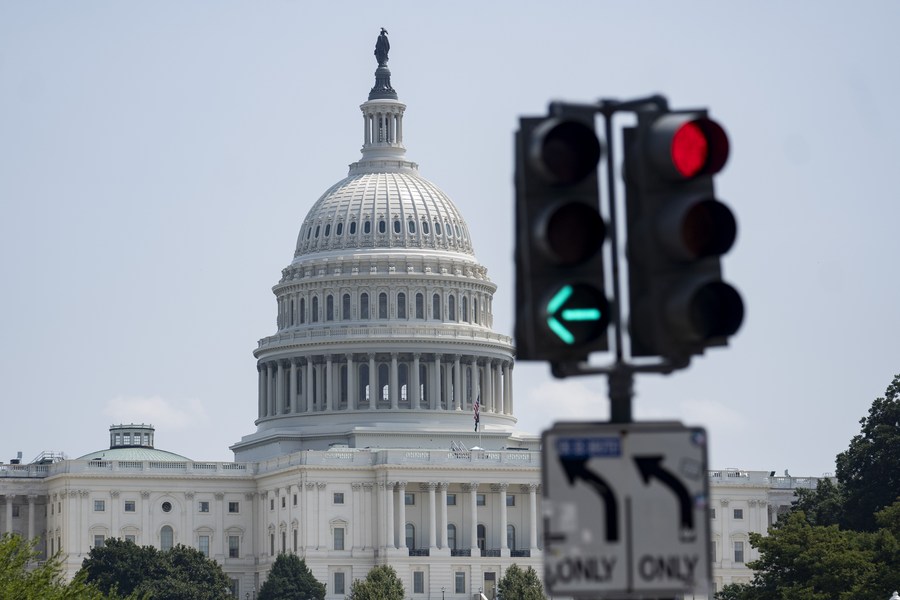Ukraine crisis is a conflict of attrition





Washington more fractured and fractious
http://m.tyhy56.com/a/202212/26/WS63a8d755a31057c47eba60af.html

With the Democrats retaining control of the Senate and the Republicans securing only a narrow victory in the House of Representatives, the electoral dust of the US midterm elections has settled. Republican control of the House means that the Biden administration will have great difficulty building on any agenda during the last two years of this presidential term. This has significant implications both domestically and internationally.
Domestic implications
Undoubtedly, the US midterm electoral results will exacerbate partisan confrontation and political polarization. By leveraging their control of committees, the House Republicans will be certain to take a more active oversight role by launching a series of investigations into the administration, such as probing into the military withdrawal from Afghanistan, the business dealings of Hunter Biden, the FBI search of Mar-a-Lago, and the Biden administration's border policy, or even by attempting to impeach President Biden in retaliation for the two impeachments of Donald Trump by the Democratic House, all of which will be bound to incur an enormous amount of partisan rancor.
Furthermore, one more consequence from the 2022 elections is that former president Trump will be the biggest loser. In spite of President Biden's low approval rating due to the highest level of inflation in the US in over 40 years and concerns about crime and the security of the southern border, the so-called giant "red wave" did not happen. A slew of Republican candidates lost in key battleground states in the 2022 midterm elections despite Trump's endorsement. This indicates that Trumpism has been blunted significantly.
Under such a situation, Republicans are likely to be consumed with infighting, with many senior Republicans holding Trump responsible for the loss of the midterm elections, and some of his staunchest allies inching away from him.
In addition, the midterms will have significant implications for national policies of climate change, and immigration. With a slim majority in the House of Representatives, Republicans will be able to contest President Biden's climate change and immigration agenda.
As for climate and energy, Democratic control of the House would have enabled the Biden administration to push for clean energy and climate priorities on the international stage. In contrast, Republican control of the House will accelerate fossil fuel development rather than clean energy projects, and it could try to minimize the impacts of the Inflation Reduction Act through oversight to retard the new-energy-oriented consumption that aims to reduce the carbon footprint of Americans.
With regard to immigration, Democrats continue to propel Deferred Action for Childhood Arrivals, Temporary Protected Status reform, Afghan Adjustment, and other immigration reform in the omnibus or National Defense Authorization Act. Nevertheless, with their slim margin of control, the Republicans will be able to rule out any immigration reform.
International implications
The results of the midterms will also have profound implications for US foreign policy, particularly that related to Ukraine, China and Iran.
First of all, they will impact on Biden's agenda for military assistance to Ukraine. The Biden administration has authorized more than $66 billion in aid to Ukraine that has been approved by Congress since the conflict began nearly 10 months ago. Many senior Republican Congressmen have expressed opposition to large-scale aid for Ukraine. Kevin McCarthy, the current House minority leader, and the likely next speaker of the House, told Punchbowl News that a Republican-led House would be reluctant to ratify "blank check" assistance to Ukraine.
It is predictable that in the next two years, although there will still be strong bipartisan support for Ukraine, a Republican-led House will slow down the current pace of assistance, blocking large amounts of aid funding from being easily approved.
As for the US' China policy, given the fact that four out of five Americans now view China unfavorably due to being influenced by politicians and media demonizing China, both Democrats and Republicans already adopt a tough stance on China. However, a Republican-led House could complicate Biden's policy toward China and undermine its constructive components as Republicans generally take a more hawkish stance on China.
Therefore, a Republican-led House will push for the legislative process of China-related bills as Republicans focus on highlighting issues with China. Representative Mike McCaul of Texas, the incoming chairman on the House Foreign Affairs Committee, is reportedly to make assistance to Taiwan a top priority, including increasing Taiwan's military capabilities, and strengthening US-Taiwan relations. Besides, McCarthy has also vowed to visit Taiwan when he becomes the House speaker. Should that be the case, it will be detrimental to the Biden administration's stated goal of putting China-US relations back on the track of stable development, and boosting US-China cooperation on climate change and the energy and food crises.
With regard to foreign policy related to Iran, although the Biden administration has pushed for reviving the 2015 Iran nuclear agreement reached under president Obama after Trump unilaterally withdrew from it in 2018, it will suffer from Republican obstruction. With a Republican-led House taking a tough stance on Iran, it will be difficult for the Biden administration to revive the agreement, hence hampering international cooperation in settling the Iran nuclear problems.
In short, the US midterms in 2022 have generated a divided government, thus causing significant implications for both domestic policies and foreign policies. Suffering partisan confrontation and political polarization, it will be difficult for the Democrats and the Republicans to reach consensus and cooperate, thereby harming not only US interests but also the interests of the international community. To promote US interests and international peace and development, Congress should transcend partisanship.





























